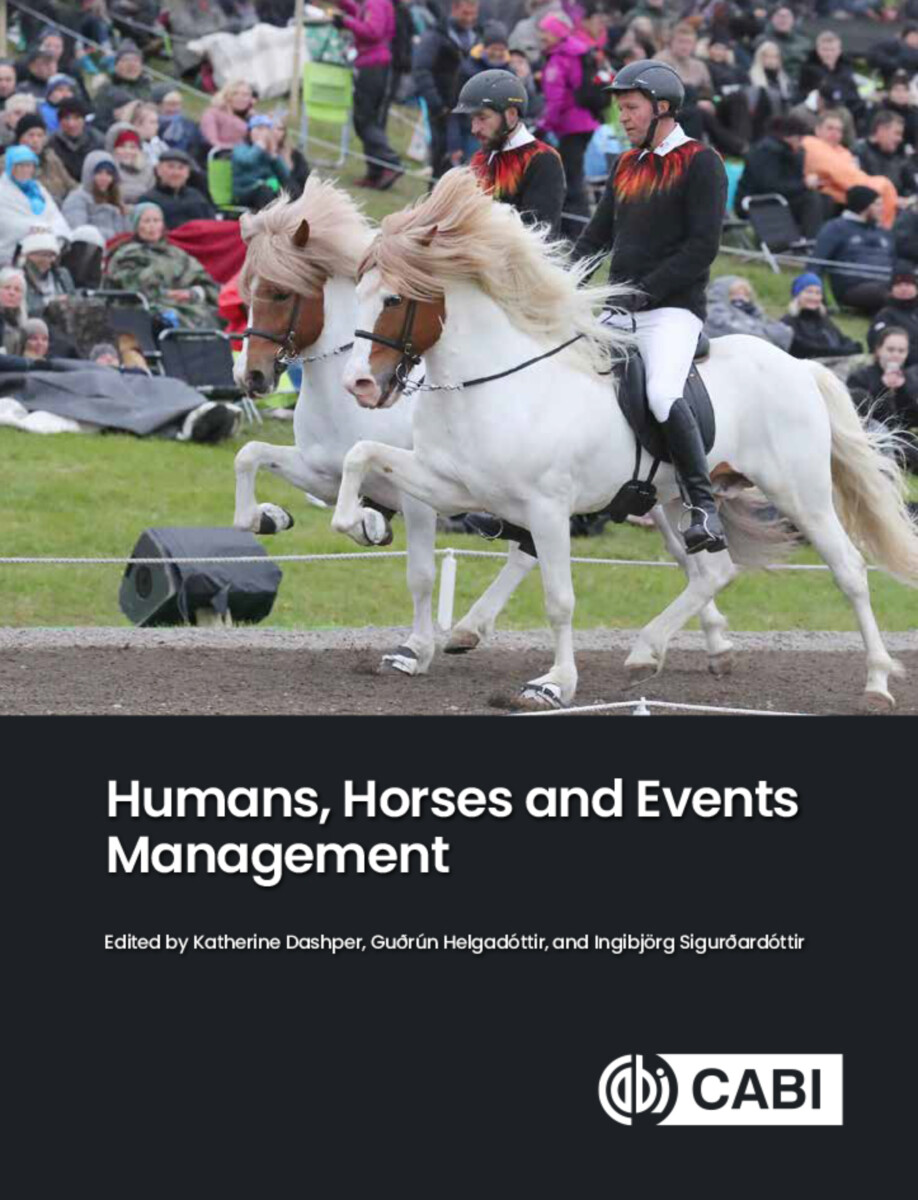Humans, Horses and Events Management
- Publisher
CABI - Published
15th March 2021 - ISBN 9781789242751
- Language English
- Pages 168 pp.
- Size 7" x 9"
There is considerable research on equestrian sport, but virtually none on equestrian events. Similarly, while event management is well covered by the literature, few consider how non-human attendees can affect management issues. This book forms a contribution to two fields, using the National Championships of the Icelandic Horse as an extended case study to explain in depth the process of managing an event, as well as the larger theoretical implications of event management.
Drawing on diverse viewpoints and theoretical perspectives, the book draws wider comparisons to connect event management to larger themes in the social sciences, such as: human-animal relations; nationalism; place branding; economic impacts; event experience; and inclusion and exclusion. In relation to human-animal studies, it focuses on how the horse breed is marketed and celebrated through top-tier competition, whereas from an events management perspective, it considers the role of the event in community building, the practical aspects of running a sustainable equestrian event, and the issues that arise in multispecies event contexts.
This book:
- Uniquely draws together events management and human-animal studies.
- Formed from empirical research conducted by a multinational team of event management and tourism researchers.
- Uses a single, extended case study to explore a range of themes and issues, both empirically and theoretically.
A valuable resource for researchers of event management, human-animal studies and tourism, this book also provides an in-depth look at end-to-end event management for industry professionals.
1: Introduction: Managing and experiencing an equestrian event
SECTION 1: THE MAKING OF AN EVENT
2: Event communities
3: The star of the show: the Icelandic horse
SECTION 2: MANAGING THE EVENT
4: Strategic management of horse-related events: The case of the National Championships of the Icelandic Horse (Landsmót) 1998-2008
5: Event management and organisation: The execution of Landsmót, Reykjavík 2018
6: Segmentation, marketing, venue selection and competitiveness of events
SECTION 3: EXPERIENCING THE EVENT
7: The Visitor Experience at a Horse Event.
8: Volunteering at Landsmót: Gaining knowledge and experience
9: Horse welfare at events
SECTION 4: THE MEANINGS OF THE EVENT
10: Identity construction in relation to niche events: Images of Landsmót in social media
11: Multispecies encounters in events
12: Landsmót: A short documentary
13: Economic impact analysis of Events: Landsmót 2016
14: Community impacts of events: Resident expectations and experiences
SECTION 5: EVENT IMPACTS AND LEGACIES
15: Event legacies
SECTION 6: COMPARISONS AND CONCLUSIONS
16: Comparing Landsmót 2016 with other equestrian events: the case of the Alltech FEI World Equestrian Games™ 2014 in Normandy
17: Conclusions: Planning, managing and experiencing equestrian events
Katherine Dashper
Katherine Dashper is a reader in events management at Leeds Beckett University, UK. Her research focuses predominantly on human-animal relationships in the context of events, tourism and leisure, with particular interest in horses. She has published widely in international journals and books on issues related to human-horse relationships, gender, tourism, and events management. She has published a monograph on human-horse relationships in sport and leisure, and co-edited four books on tourism and sport. In 2018, she organized the international conference "Equine Cultures in Transition: Human-Horse Relationships in Work and Play." She is a rider and regularly competes in equestrian sport events.
Guðrún Helgadóttir
Guðrún Helgadóttir is a professor of tourism at The University of South-Eastern Norway and Hólar University, Iceland. She has led numerous research projects and published in international journals on equestrian tourism, events and tourism sustainability in addition to co-authoring and illustrating a textbook and a handbook of best practice in equestrian tourism. Guðrún has organized a number of conferences and volunteered at various events. She developed a diploma program of study in event management for Hólar University in Iceland. She is an amateur equestrian.
Ingibjörg Sigurðardóttir
Ingibjörg Sigurðardóttir is an assistant professor and the head of the department of Rural Tourism at Hólar University, Iceland. Her educational and practical background is in management and business administration, tourism, equine science and agriculture. Her recent research focuses on horse events and equestrian tourism. She has published in international and domestic journals and books on tourism, events, horses, and business. She has written and published different kinds of teaching material for university level and practical handbooks for business operators, both individually and with international co-authors. She has led research- and business development projects and participated in organizing international seminars and conferences on horses and tourism. She is an accredited young horse trainer within The Icelandic Horse Trainers Association, a horse breeder and an owner of a horse transport business.


